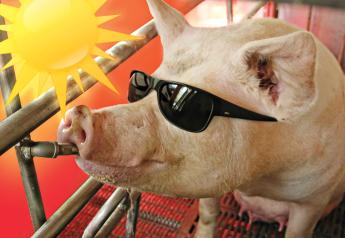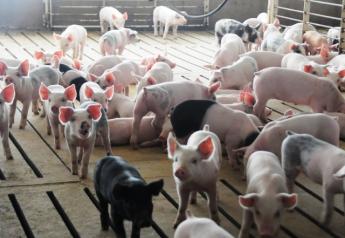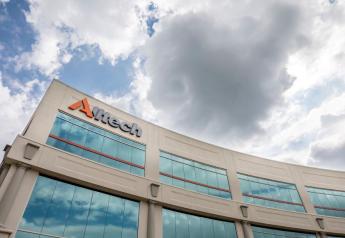Meatpacking Industry Responds to U.S. Congress Investigation
Farm Journal Pork 020321
A U.S. Congress panel is investigating COVID-19 outbreaks at meatpacking plants nationwide, according to a statement issued on Feb. 1.
The House of Representatives Coronavirus Subcommittee approached JBS USA, Tyson Foods and Smithfield Foods to provide records of inspections, complaints and other internal documents as part of its investigation into coronavirus infections and deaths in meatpacking plants.
The Subcommittee has also asked the U.S. Occupational Safety and Health Administration (OSHA) to provide records of its efforts to enforce worker safety rules.
James Clyburn, committee chairman, said public reports indicate that meatpacking companies have refused to take precautions to protect their workers.
But Keira Lombardo, Chief Administrative Officer at Smithfield Foods, points out there are inaccuracies and misinformation in the media on this issue. She said the company looks forward to providing the Subcommittee with correct information.
“As a critical food producer, we have taken seriously our responsibility to protect the health and safety of employees while continuing to provide food for our nation. From early in the pandemic, we have taken extraordinary measures to protect our team members from the virus and we have met or exceeded the prevailing federal, state and local health and safety guidance, including with personal protective equipment,” Lombardo said in a statement.
Public health guidance has varied widely around the world and across the U.S. throughout the pandemic, but more than $1.5 billion in comprehensive protections instituted since the spring successfully cut average case rates for meat and poultry workers five times lower in December 2020 than they were in May, while infections rocketed up by nine times for the general population in the same period, Sarah Little, Vice President of Communications for the Meat Institute, said in a statement.
“The meat and poultry industry is focused on continuing these effective protections, reaffirmed by the Biden Administration, and ensuring frontline meat and poultry workers are vaccinated as soon as possible, as employers, unions, civil rights leaders, and governments around the world agree these workers should be among the first vaccinated after healthcare workers,” Little said.
For example, Smithfield Foods alone has invested more than $700 million in critical measures to protect employees, including on-site COVID-19 pre-screening and testing facilities; air purification systems; extensive physical barriers at work stations; employee protective equipment; significant facility modifications and expansion to ensure distancing in key areas; thousands of sanitation stations and prominent banners and signage that outline and encourage safe practices in multiple languages; and the addition of new employees whose sole job is to ensure distancing and sanitation practices are implemented correctly.
They have also implemented generous leave programs and established policies and protocols to ensure that Smithfield employees are free of a COVID-19 diagnosis and must not have any symptoms of COVID-19 to report to work.
A JBS USA spokesperson said their company welcomes the opportunity to provide members of the Subcommittee information regarding its response to the global pandemic and its efforts to protect its workforce.
“Since the onset of the pandemic, JBS USA has invested more than $200 million in health and safety interventions, more than $160 million in bonuses and permanent increased pay, and donated more than $50 million to support our local communities,” a company spokesperson said.
Similarly, JBS USA has implemented hundreds of safety measures. The company provides immediate testing to all symptomatic team members and close contacts, and has conducted more than 45,000 surveillance tests of asymptomatic team members to date.
“In addition to the hundreds of safety measures implemented in our facilities, we have voluntarily removed vulnerable population groups with full pay and benefits, covered 100% of all COVID-19 related health expenses for our team members and family members enrolled in our health plan, and offered a $100 incentive bonus for any U.S. team member willing to get vaccinated,” a JBS USA spokesperson said.
The U.S. has now seen more than 26 million positive cases of the novel coronavirus, with more than 441,000 deaths.
“The virus has reached – and hurt – every part of our society. We are an integral part of communities where we operate, from coast to coast, and our measures have been successful for a sustained period of time,” Smithfield’s Lombardo said.
Farm Journal’s PORK reached out to Tyson and will update when they respond.
Read more:
U.S. Congress Panel Investigating COVID-19 Worker Safety at Meatpacking Firms
Worker Absenteeism in Packing Plants is No Surprise
COVID-19 Case Rates in Packing Plants Decline as General Population Rate Soars
Smithfield CEO: Processing Plants Must Keep Running
Community Gathers to Cheer Employees at Smithfield Pork Plant
Smithfield Foods Addresses COVID-19 Response
At a Crossroads: Where Does the Pork Industry Go Next?
Future of the Food Supply Chain: What Trends Are Sticking Around?
CDC Prioritizes Frontline Meat Workers for COVID-19 Vaccination
UFCW, Meat Institute Ask Governors to Prioritize Vaccinations







